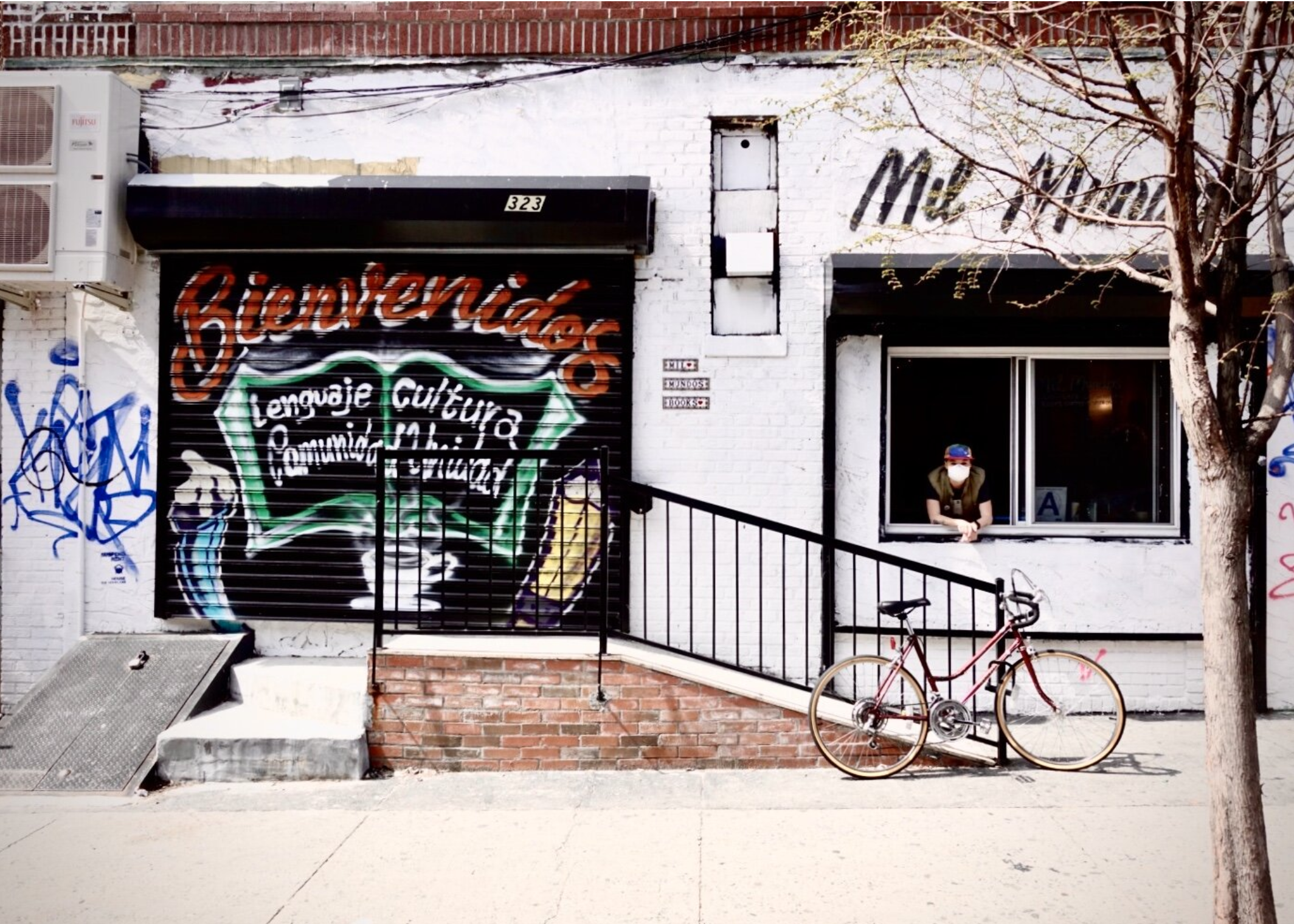Just days after the anniversary of its opening March 2019, María Herron was forced to draw the metal curtain over the doors of her bookstore, Mil Mundos. COVID-19 had spread rapidly in New York City and booksellers were not considered essential businesses. Without visitors, the pages of the books in her shop would remain unturned and idle on their shelves, but she would not.
Herron, the bookstore’s volunteers and collective members came together to push back shelves and put books and knick-knacks in boxes to make room in the 500 square foot store. The community around her was in crisis and there was work to be done.
“Real talk, thousands of people were dying and millions were already living week to week… you can’t be shook by the information,” Herron tells Remezcla. “You have to address it.”
Within the month, the only bookstore east of Myrtle Avenue in Bushwick would become a makeshift warehouse for distributing protective gear and food to Bushwick residents in need. Thanks to a partnership with a mutual aid network, Bushwick Ayuda Mutua, Mil Mundos is helping to feed 200 families with only $3000 dollars a week.
Community funds and resources like mutual aid networks have popped up across the country throughout the pandemic, supporting groups who are left behind by a government that has arguably failed to provide adequate safety nets for its most vulnerable populations—namely Black and Brown communities. With the unemployment rate at just under 15% nationally, a Pew Research Center study found that nearly half of Hispanics said they or someone in their household has taken a pay cut or lost a job due to the pandemic, compared with 33% of all U.S. adults. Meanwhile, in Bushwick, 1 in 54 of its residents have reportedly tested positive for the coronavirus.

“Mil Mundos was never just about selling books, you know?” said Lucia Cozzi, a Mil Mundos volunteer and collective member.
The collective’s sense of duty was baked into the bookstore from the start. In fact, the four pillars of their vision are graffitied on the black metal curtain that keeps the store shuttered. “Lenguaje, Cultura, Comunidad, Unidad,” it reads. A commitment Herron says they’ll stick to through the pandemic, with or without a space.
Closing up shop hurt her sense of pride as a business owner, she admits. But, after she reassessed, Herron realized that the physical space was just a means to an end. It was a process of “radically, compassionately, clumsily, re-envisioning space,” she said.
While the means had changed, the end—their mission to serve the community—remains unfettered. The community was built through an intangible web of actions that provided trust and support. Suddenly, all the Latinx Mil Mundos volunteers behind the store were “in a position to acutely empathize” with their neighbors, said Herron.
“Mil Mundos was never just about selling books, you know?”
The collective joined a Slack for the neighborhood’s mutual aid partners. A channel named #Spanish included “hundreds and hundreds of missed calls and messages” to their Google Voice number distributed via paper flyers.
“People are calling in saying ‘oh I used to work in a bottle and can collection’ as if they owe us an explanation… it’s ludicrous.” Cozzi and a few others called everyone back. As a business entity, Herron and Mil Mundos negotiated the contracts with grocery wholesalers and brought the cost of a week’s worth of groceries for a family to just $15.
Despite a manageable rent, having to permanently shutter the only place to browse books in the neighborhood is more of a possibility every day that the pandemic forces the doors closed. As New York state enters phase one of the Governor’s reopening plan, no specific re-opening date is set for all New York City businesses.
“Rent is a certain dollar amount and if that space isn’t doing that dollar amount for the community… we would first question if we should even try to afford it,” she said. She’s more concerned with pioneer mutual aid as a long-run “mode of operation” in Bushwick.
“We don’t know what’s going to happen but we’re going to try and make sure we take care of ourselves so we can take care of others.”
In the evenings, volunteers at Mil Mundos deliver books ordered online and on Instagram on bikes to keep the business afloat. They’re also offering six-week Spanish courses via Google Hangouts starting this week. Herron raved about them: “Our Spanish classes are f*cking lit.”
“Heritage,” for example, is a class designed for students who grew up around or with the language but were not able to develop a comfortable understanding or fluency.
“There’ll be that space for people who feel shame, never developed an accent or feel very gringo/a,” she explains.
Find more information on Mil Mundos, its books and courses here.







